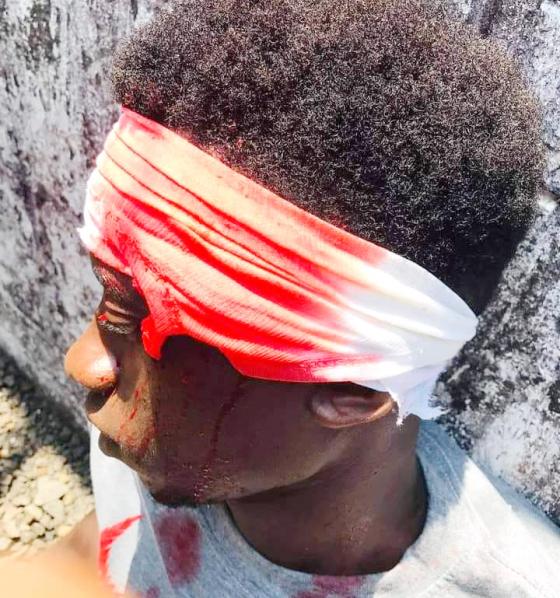UL Protest Turns Bloody

Protest on the main campus of the University of Liberia turned bloody on Monday, August 2, when riot Police dispersed protesting students with rubber bullets, leaving several students wounded.
Students and staff of the state-run University of Liberia were on August 2, 2021 in total disarray when members of the campus based student political group, the Student Unification Party (SUP), took to the street to protest against the Electronic Learning (e-learning) program introduced by the university.
The situation especially escalated when the students assembled on the main Capitol Bypass, blocking traffic and were countered by the Emergency Response Unit (ERU) and the Police Support Unit (PSU), all of the Liberia National Police.
The police fired tear gas to disperse the protesting students, but that could not calm the situation, as the protesters remained intransigent and continued their protest, calling on the university authority to bring back the in-person learning in the classroom instead of e-learning which, they claim, has no positive impact on them in their academic pursuits.
As the protesting students continued to challenge the police, some students sustained injuries, though it is not established yet that the victims, some of whom sustained injuries on their heads, were wounded from bullets.
Protests at the University of Liberia are usually held on the campus or nearby, but the August 2 protest extended to 12th Street in Sinkor, where the protesters blocked the main Tubman Boulevard and damaged a vehicle they claimed was forcing itself among them.
E-Learning, however, has been partially introduced for students and staff of the University of Liberia since 2019 when the George Weah Administration took over, it was not active until 2020 when the Coronavirus pandemic became serious thus bringing health restrictions including social distancing in place.
To continue learning, the UL Authority halted in-person learning and reinforced e-learning in 2020, but this technological learning approach still appears new and difficult for both students and teachers.
The first phase of this program seemed not to have yielded better results. Some instructors of the university cannot use the system effectively to teach students online as it is expected, and the majority of students there do not have active email addresses and not more acquainted with other programs on the internet besides Facebook.
The second wave of the Coronavirus this year led the administration to suspend in-person learning to reintroduce e-learning, but the bad experience from last year does not put the students in the position to accept this system of learning thereby, causing them to rise and protest.
In spite of plea to abolish the e-learning, the administration is yet to respond with the expected answer. “Sarwolo Nelson has members of his Methodist Church sitting under his preaching, but he does not want us learn in the classroom. We will not allow e-learning here, and we will stop entrance examination the university has decided to administer for candidates who will come here to sit the entrance. If we cannot learn in the classroom because of COVID-19, then, people should not sit for entrance in the classroom and Sarwolo Nelson must not have church members sitting under his preaching. Let all of us go to e-learning,” the protesting students contended.
The protesting students also argued that other private universities have students attending classes amid the current wave of the COVID-19, but University of Liberia is the only institution implementing health restriction; something they claim is meant to deprive them of better learning in their academic sojourn.
Calls made to the UL authority for its position on the unfolding event yielded no answer, but other sources in the realm of the staff said the administration was consistent with its decision on the e-Learning because of the COVID-19 and there was no sign of making any change now until cases of the virus drop and the Ministry of Health relaxes the restrictions.
